Final Fantasy XV: One Year Later
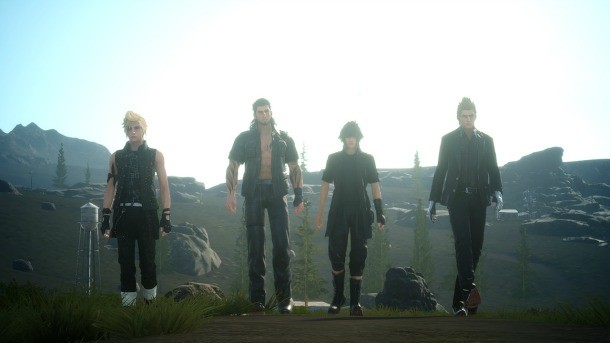
It seemed like Final Fantasy XV had the odds stacked against it. Coming off the divisive Final Fantasy XIII and its spin-offs, a grueling development cycle spanning over a decade, and a change in directors midway through, the game had a lot to prove. Many questioned if the series could stay relevant in modern times where open-world RPGs like The Elder Scrolls and The Witcher dominate the sales charts. Final Fantasy XV marked a big change for the franchise with a more open structure and action battle system. Much was riding on its success and, thankfully, it did what it needed to: earning accolades and reaching global sales of 6 million faster than any Final Fantasy entry to date. But perhaps its greatest achievement is its post-launch content, with a steady stream of free updates, paid DLC, and a multiplayer expansion. This model is different than anything Square Enix has done before with a single-player Final Fantasy game. We visited Square Enix's studios in Japan to chat with the team, look back on how the game has changed through its first year, and see what's in store for the future.
[Editor's Note: This feature originally appeared in issue #297]
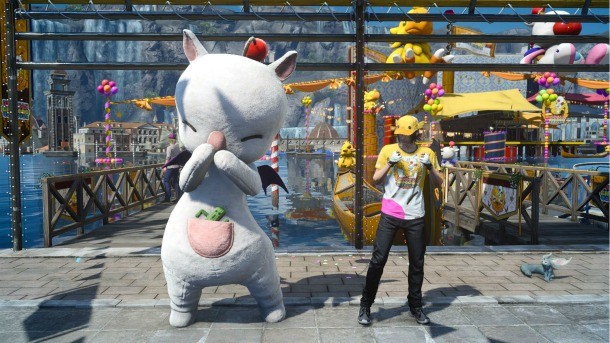
A New Approach
When director Hajime Tabata took the reins from Tetsuya Nomura back in 2014, he knew he had a lot to tackle not only on the game, but also with fans disappointed at the project's lack of updates and continual delays. Instead of keeping things secretive, as Square Enix had done in the past, he openly enlisted the help of fans for feedback. He has always been fond of this direct communication style, and considered their opinions in the development process. "We had such a curiosity about how they'd take the game and how they'd react to it because obviously, this is not a game we set out to do on the same kind of direction as the previous entries," he says. "We deliberately took [the series] in a new direction to try and expand and make it something new. We were excited to see what the traditional fans would think, but a bit scared at the same time as well."
Tabata said the feedback was good, but he also heard many negative comments. That didn't discourage him, though; he looked at it as an opportunity to improve those elements, even after launch. "We were told by the fans what we should be improving and expanding on in the series," he says. To this day, the team keeps fans in the loop with a video feature called Active Time Report, which highlights the game's continual progress.
| All The Spin-Offs |
| Final Fantasy XV had its share of related projects spanning various media, from film to mobile games. This has caused some confusion about what all these parts entail and their necessity to the lore. But is it too much? Has the team felt it may be diluting the identity of Final Fantasy XV? “That’s something we are, in fact, very concerned about,” says director Hajime Tabata. “What we’re trying to do is actually quite simple in essence, but it’s something that maybe is quite difficult to get across. I think we’re going to have to work a bit harder to get that message across in the future. Obviously, the people who bought the main game are the most important to us. It’s a group of people we feel we have to value very highly, so expanding on the main game and improving it for those people is our number one priority. That’s what we’re really aiming for and it’s showing in what we’re doing. We also want to expand the audience and bring new people into it and these side games are a part of that.” |
Since launch, Square Enix has been dishing out improvements - ranging from off-road modifications for the Regalia and an alternative take on the penultimate chapter - to fun content, such as a Moogle Chocobo Carnival and Assassin's Festival, a collaboration with Ubisoft's Assassin's Creed franchise. Adding such substantial post-launch content is a radically different approach for a company steeped in tradition, but it was important to Tabata. "This is a game we kept people waiting for such a long time," he explains. "We felt [that] rather than having the traditional model where you release the game and then say, 'Okay, that's it," we'd rather go for the service-type model and take a bit longer to give back to those people because they've been waiting so long - we felt we had to give back to them somehow."
Since this model was unfamiliar to Square, Tabata acknowledges it wasn't conveyed well to players at launch. "What we could have done a little bit better was communicating the game as a service model and shared that information with the new players right from the start and gave them a [better] idea of what they can expect and what this whole overall project is about."
Square Enix largely considers Final Fantasy XV a success, both from a financial standpoint and for bringing in new fans. Its profitability made the free updates possible. "The reason we decided to do [ongoing free updates] was looking at the day-one sales and the profits we made back on the game," he says. "It's also a way to thank the users who bought the game and give back to them as well. That was a big factor in deciding to do that one year of free updates. Of course that was a very limited period, limited to the first year of the game. We have to reexamine that and look at what we're doing for our plan next year."
The growth of the fan base is also starting to show. "I think since the release of Final Fantasy XV, there are a lot more people now who have played Final Fantasy and even if they haven't, they have at least heard about it, or they never had any interest at all in Final Fantasy and they got a little bit [curious]," Tabata says. "That's one big change that I've certainly felt myself happening."
Tabata also takes note of how the demographic of the fan base shifted with this entry. The main volume of players used to be in their mid-30s, but now it's mid-20s. "That's not saying the fans in their 30s and 40s don't like the game; they're still in there as well, but I think it shows the amount of time and investment we put in this game," he says. "The fact that we've expanded on the demographic of the user base there is a very big achievement and very important to the future of the franchise."
This past year also included episodes focused on individual characters and a multiplayer expansion for purchase to keep hardcore fans invested. However, that's hardly the end of the team's plans to support the game in the future. "We actually only had a proper plan for the game up until the end of this year, and we were sitting down and like, 'Okay, what are we going to do after that? Is that going to be the end? Where are we going to take this?' We decided the best way [to figure that out] was to discuss it with the fans and get their opinions and find what they [still] wanted from the game. So we've done that now. We discussed with fans in Europe, America, and Asia as well. And we pretty much decided we want to carry on after that to finish off at the end of next year."
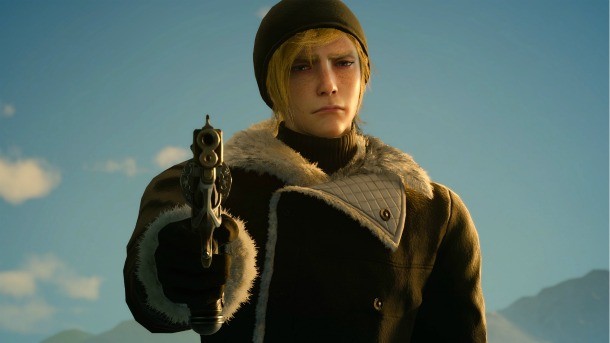
Improving The Game
Most fans' biggest complaints have already been addressed, from the problematic chapter 13 to the addition of New Game Plus. However, Tabata and his team feel there's room for improvement and even new features left to implement. One of his biggest goals in the next year is to add more to the story and lore. "There is still something missing, not quite satisfactory yet, in the way the story explains itself and the information you get there - that's what I think I need to still focus on," Tabata says. As to what this entails, Tabata said he wants to go deeper into the background of some characters and their personalities alongside explaining more about Eos itself. "There's more of a backstory to this world that this game takes place in than [the game] had," he says.
Tabata also couldn't help teasing more than just story enhancements. "There's also one other thing - a completely new gameplay experience I want to provide to players of XV as well. I can't tell you what that is yet, though. We're currently thrashing through the plans for that and getting it into shape, so we can announce exactly what that is at the beginning of next year."
He also clarified more regarding future DLC. "The important thing is [that] we want to release DLC that's closely linked to the main game - the main story - and has a strong influence on that, rather than something somewhat peripheral and unrelated. That's the kind of content we're looking at."
[Click to the next to learn more about multiplayer expansion and what's in store for the future...]
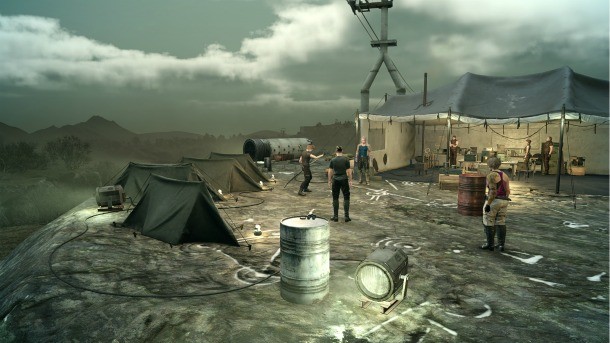
Making Multiplayer Matter
Final Fantasy XV didn't stop with updating its single-player experience, it also released a multiplayer expansion called Comrades, which is included in the season pass or can be purchased separately for $19.99. "The core pillar at the center of the game is the experience of going on a journey with your comrades - your friends," Tabata explains. "We felt because we created such a detailed and exciting world, people would naturally want a mode where they could explore and experience it in another way together with friends. That was a natural progression we felt."
Comrades is more than just an excuse to experience XV's combat with your friends, as the expansion actually fills in the gap between the game's final two chapters. "The story told within Comrades covers the missing 10 years of time at the very end of the story," Tabata says. In it, you create your own character, a member of Kingsglaive, the Lucian royal fam ily's special unit forces. "As survivors, players will get to know how the Kingsglaive soldiers felt toward Noctis and friends, along with how they were able to provide support for them during the time gap," says Comrades director Kazuya Takahashi. "What we wanted to have was at the end of this single-player game, all the players come together and do things in this world [which] will ultimately have an effect on the [initial] game itself," Tabata teases.
The team is aware most people play Final Fantasy for a single-player experience, so part of the challenge was figuring out the best way to bring fans into a multiplayer setting. "Since the majority of Final Fantasy XV players prefer to play single-player games, one of the most important points that we tried to achieve is to provide those players with an easy entry point to experience multiplayer games as well," Takahashi explains. "As such, we did our best to remove elements that trigger players on a team to blame a player for their mistakes. For that same reason, we developed A.I. party members/Comrades for those who want the option to play as single player."
Just like the base game, Comrades will receive regular updates with new content. At the time of this publication, whether or not any of those pieces of content will be paid remains to be seen. "We're still determining the specifics regarding the road map, but we would like to support Comrades as much as possible," Takahashi says. "In a Comrades update, we will be making Noctis, Gladio, Prompto and Ignis playable. Additionally, we're planning on including additions like Gears, Royal Sigil, Chef, and Outposts that haven't been released yet in Version 1.00." Right now the level cap is 50, but Takahashi says they're also planning on increasing the that with a future update. [Editor's note: Since publication, a new update added timed quests and improved loading times.]
| Biggest Missteps |
| Looking back on the first year, we couldn’t help but discuss some of the biggest lessons learned along the way. After all, hindsight is 20/20. Director Hajime Tabata was candid about the struggles of implementing a more open world. He said the challenges went beyond just the technological side of things. “You really do need to alter the way the whole project is approached from the developmental point of view,” he says. Tabata said at the end of 2015, the team was just putting all the parts of the game that were being developed separately together. “There were so many issues and problems that we only became aware of in that time and I think that linked into why we didn’t get the game to the exact level we wanted for the final quality,” he explains. “The traditional model involves ramping up the number of staff involved on a project as you go along, especially at the final part of the project. If you do that there are just some issues that don’t become obvious at the start. If we’d do it again, we’d use a completely different model and have that full development style right from the start.” Tabata also discussed how he wished having an open-world design and then swapping halfway to a more linear style was handled better. “I think looking back on it, it would have been nice to have that as a more gradual transition rather than an abrupt change.” Looking at data, he also noticed a big difference between when newcomers and veterans put down the game. “The place where most of the core-series fans found difficult or quit was chapter 13, but the new players, a lot of them quit at the point where it switched over to the linear style. I think perhaps there’s a reason for that there, and we should have done something about that”. |
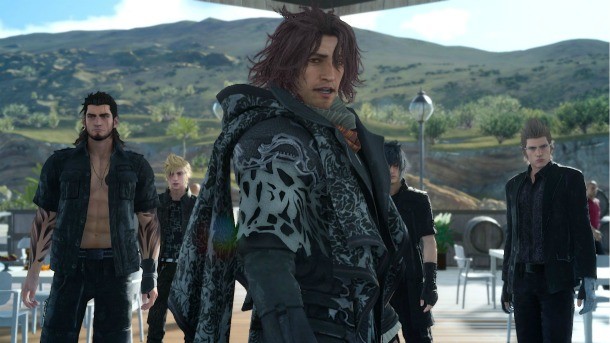
Paving The Way For The Future
While there's still plenty more on the way for Final Fantasy XV in the next year, Tabata and his team are already planning how to properly conclude it in a satisfying way. "We've had this idea for quite a while now of how we're going to bring the game to the end," he says. "We call it, 'The end of the journey - the end of our journey.' Again, it's a project that we've come all the way from the beginning alongside our fans and we want to bring it to an end together with those fans."
Time will tell if the success of this content model will continue with other Square titles. "I think it's more of a case that there are more options available for future Final Fantasy developers - this idea of a service model and as a way you interact with the fan base of the game," Tabata says. "It's not a single point in time, it's carrying on in continuous contact with them. I think that kind of option, that kind of model, is something [Square Enix] may want to take up for future Final Fantasies."








